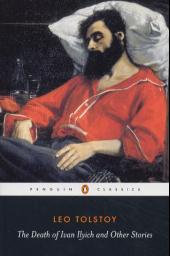The first of the post-conversion literary works.

Leo Tolstoy (1828-1910)
Notes on some Historical progression into Tolstoy’s time.
Periods of Literature and Thought
I. Enlightenment (mid-17th to late 18th century). The Age of Reason.
Voltaire, Diderot, and the Encyclopedie.
Descartes, Cogito, ergo sum.
Sir Isaac Newton, Alexander Pope, satire, travel narrative (slave narrative)
Nature as a perfectly ordered sphere revealing patterns of divine order everywhere.
II. Romanticism.
Nature the pastoral and the sublime.
Passion over reason
The Individual gains primacy over the collective.
Historical occurrence—deposition of monarchs and the French Revolution.
III. Realism in literature.
Hold a mirror up to nature, reality.
Romantic heroes are too high-born, noble to be real—a new kind of hero
is born.
Leo Tolstoy (1828-1910)
Russian society in flux creates a generation of the finest writers ever. Turgenev,
Pushkin, Gogol, and the big three Tolstoy, Dostoevsky, Chekhov.
Part of the transformation has to do with the historical and philosophical developments
of part one (with the industrial revolution). Another incident of major significance
is the Emancipation of the serfs in 1861.
| The Death of Ivan Ilyich (1886) The first of the post-conversion literary works. |
 |
Reading the first chapter. We hear of the death and the reaction by quite a
few of Ivan’s contemporaries, and even of his wife. What is the overall
impact of these descriptions?
[my own reaction would be to have some pity for the deceased—it is not
right that he be honored in this way. We begin to feel that everyone around
him is wrong, but that poor old Ivan doesn’t deserve this]. What we find
out later is that this is very much Ivan’s world, and that he kind of
does deserve this.
The novel announces itself in the first chapter as a kind of social satire.
We look at the various acceptable acts and thoughts and there is both humor
and a certain amount of pity contained therin.
a. speculation on the posts that will now be opening up.
b. the tiresome demands of propriety.
c. the performance of the role of aggrieved friend. One has not been admitted
to the fraternity of mourners and is desirous of a proper performance.
d. the instant separation from the former friend, who is now in a state which
one does not want to associate with oneself.
e. the irritation of having the pleasant course of one’s life interrupted.
(top of pg. 19, where the despondency grows).
f. the widow’s characterization of Ilyich’s suffering based on its
effect on her.
Part II, however, announces itself in a way that brooks no interpretation—here
the narrative consciousness is clear.
What confronts us as readers is how to extract from this kind of story the most
useful kind of material. There is, as realist literature would have it, an identification—do
not the same kinds of questions about how to live a good life assail us. What
is the right way to live? What about the way that society indicates we should
live is not necessarily the best kind of advice? How do we approach the idea
of death without avoidance (although it seems to me that the story we read is
more about life than it is, really about death).
Three points of commentary:
The value of simplicity and avoideance of the entrapment by social conventions
shown in the altogether admirable figure of Gerasim, the butler's assistant.
The value of childhood (before social conventions have their corrupting influence)
shown in the way Ilyich's memories keep returning to childhood as he meditates
on his upcoming death.
The son of Ilyich becomes another positive figure--allows Ilyich to connect
with a human in a human way before the end of his life.